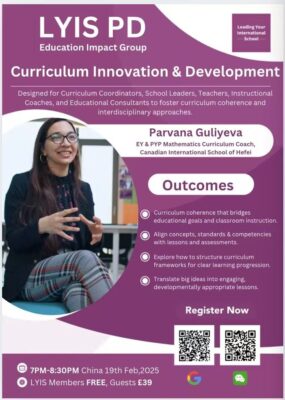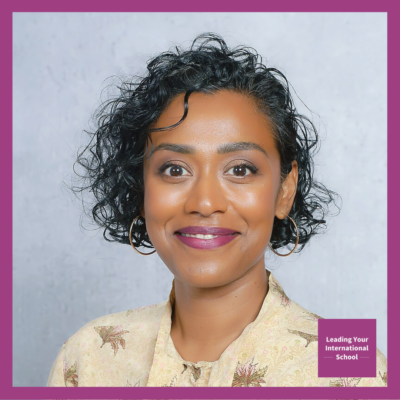by Loretta Fernando-Smith
I am an Educator
I have been an educator for two and a half decades. I am a fourth-generation teacher; teaching is in my DNA. My mom recounts stories of four-year-old me standing on a lawn chair in the backyard, lecturing the trees.
Changing Roles and Doubts
For many years, I had the privilege of exploring the world with the youngest learners in school. Learning and teaching felt like they merged together seamlessly; it sounded like many voices and yet also like just one, it felt joyful and safe. It felt like home. This year, for the first time, I don’t have a class. My days are filled not only with students but also with adults, meetings, curriculum documents, and navigating interactions, decisions and the expectations that come with leadership.
I feel incredibly grateful to be the Curriculum Coordinator and Associate Principal at the Wiesbaden Campus of Frankfurt International School – working in a passionate, caring, and knowledgeable community of educators, led by a supportive principal.
This summer, before starting the job, however, I had a moment of panic. Was administration really for me? Being with children gave me joy – it kept me curious, inspired, and grounded. What was I doing leaving the classroom? Doubt and imposter syndrome crept in. Who did I think I was? Could I do this job?
Narratives of Leadership
For much of my life, I held a fixed image of what leadership looked like – someone older, authoritative, powerful, blazer-clad. Growing up, I mainly experienced white, male principals as heads of schools. My experiences reinforced the belief that my identity disqualified me from leadership.
The 2024 McKinsey ‘Women in Workplace’ report notes that while women have made gains in the workplace “progress is surprisingly fragile, especially for women of color, who continue to be underrepresented at every level.”
As leadership opportunities came my way, I questioned my ability and even my right to pursue them; I talked myself out of them. I was happy and eager to support but my image of leadership made me uncomfortable – sometimes even making me feel fraudulent, being associated with it.
What does it mean to be a leader? This question kept resurfacing. While I could name educational leaders I admired, I kept returning to one story from my childhood.
Leadership in Action: A Story from My Childhood
I was born in Sri Lanka. When I was five my family left to escape the civil war. I grew up in Germany as a refugee. One morning, when I was around eight, my mom took me to the bank to cash a cheque. There was a queue stretching out the door. Mom and I got in line and waited patiently. When we finally got to the front, the teller looked past us and motioned for the person behind us to come up. This happened again and again and again. Finally, a woman said: “You need to serve this woman and her child, they have been waiting too long.” Grudgingly, the teller motioned us forward. He cashed the cheque and we walked away.
At this time Germany had just changed its bills. The ten Deutsche Mark looked very similar to the hundred Deutsche Mark. The teller had accidentally given my mom a 100 Deutsche Mark instead of 10. As my mom walked away she realised the mistake and without missing a beat, she got back in line. The teller saw her. He waved us forward furiously. My mom walked over, placed the money in front of him and calmly said: “I think you might have made a mistake.” For the first time that morning, the man looked up. He looked at my mom, a petite, brown refugee woman with a skinny little kid by her side. And he saw her: a strong, principled, caring human being.
Redefining Leadership
My mom didn’t have a title, she did not have social power or money, she didn’t have social status, and she certainly did not look like a leader in the eyes of this white, German male. But despite all of this she was a leader. She acted with integrity and stayed true to her beliefs and self. She was courageous when it would have been so much easier to be angry and blame others and circumstances. She was vulnerable. She looked beyond herself and tried to imagine another view and life; she assumed the best intentions and believed in the goodness of people. She sought connection with the hardest of people. She suspended judgement – although it would have been so easy and valid. She sought to build trust. She had an impact – even if it was on one person’s life; she changed their view and challenged their bias.
Standing in front of the teller at the bank that day, I looked up and saw my mom. A woman full of dignity, grace, resilience, love and resistance. A courageous, humble, impactful leader.
Reimagining Leadership
Leadership is about connection, courage, and a commitment to values.
I often think about that morning at the bank. I think about my former teaching partner who was “just” an assistant and inspired me to reflect deeply on my “whys” and show up with intention. I think about a principal early in my career who saw potential in me that I hadn’t yet seen in myself. I think about my current principal, who nudges me to take risks, learn, and grow. What made them leaders wasn’t their titles, offices, or positions—it was the impact of their actions.
The LYIS Principal Guide establishes an Impact Framework grounded in three core values: Ethical Leadership, Opportunity, and Sustainability. My mom’s actions at the bank that morning exemplify these values. Leadership is about connection, courage, and a commitment to values. It challenges us to be brave, open, and humble while holding ourselves and others to high expectations. It calls us to make decisions rooted in ethical standards that honor our mission, vision, and the communities we serve.
“If your actions inspire others to dream more, learn more, do more, and become more, you are a leader.” – John Quincy Adams
Six months into my new traditional leadership role, I continue to question and define leadership. What does leadership look, sound and feel like? What is my purpose in this role . . . right here, right now? How do I show up in ways that stay true to my values and beliefs? The story I told myself this summer continues to ring true. I continue to learn that leadership isn’t about authority, power or having all the answers; leadership does not have to be the mental image nor the story I grew up with. Leadership is people-work. It is about listening, seeking to understand, lifting others up and providing a service. It’s a process driven by relationships and community building.
I loved my time as an Early Years educator, but I am realizing that the safe, joyful environment that I created in my classrooms, the space to be yourself, the opportunities for learning and teaching to merge and the chance for many voices to come together as a community is what I continue to strive for as an administrator.
As I enter the second part of the school year, I remind myself: Be brave. Be open. Be humble. Be respectful. Be curious. It’s a journey. Lead with your actions, and inspire others – both young and older – to do the same.
What is your leadership story? What are your values? What impact do you hope to make? Please do share your comments and experiences.
Work Cited
“Women in the Workplace 2024 report | McKinsey.” McKinsey & Company, 17 September 2024. https://www.mckinsey.com/featured-insights/diversity-and-inclusion/women-in-the-workplace. Accessed 25 January 2025.
Loretta Fernando-Smith is Associate Principal/ PYP Curriculum Coordinator, Frankfurt International School Wiesbaden, Germany
LYIS is proud to partner with WildChina Education


